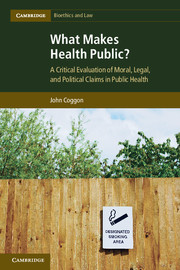 What Makes Health Public?
What Makes Health Public? Book contents
- Frontmatter
- Contents
- Foreword
- Acknowledgements
- What makes health public?
- Part I Basic concepts in public health
- Part II Evaluating evaluations: making health public
- 7 Analysis in the political realm
- 8 Making health public
- 9 Conclusion to Part II
- Part III Tackling responsibility: liberal citizens as subjects and sovereigns
- Bibliography
- Index
9 - Conclusion to Part II
from Part II - Evaluating evaluations: making health public
Published online by Cambridge University Press: 05 June 2012
- Frontmatter
- Contents
- Foreword
- Acknowledgements
- What makes health public?
- Part I Basic concepts in public health
- Part II Evaluating evaluations: making health public
- 7 Analysis in the political realm
- 8 Making health public
- 9 Conclusion to Part II
- Part III Tackling responsibility: liberal citizens as subjects and sovereigns
- Bibliography
- Index
Summary
The conceptual groundwork on public health law and ethics in Part I demonstrated the plural meanings of public health itself, and also raised the political connotations of an inquiry into the public nature of questions including ones relating to health. Part II has confirmed an earlier unproven thesis, that normative analysis of public health requires an assessment in the light of viable political norms, and thus a complete political framework to guide compelling conclusions. In other words, it is impossible to have a study ‘just’ of public health law and ethics: health is important, but public health raises political questions, and these can not be answered with just a partial view. It is therefore necessary to be clear what the political requires both for analytic study, and as a practical source of normativity.
For this reason, I have sought to establish why we would be interested in politics as opposed to morality: after all, a critique in ‘ethics’ seems to aspire to moral norms, and many critiques in health law are rooted explicitly in moral philosophy. Having established what political inquiry entails, in particular by emphasising its focus on issues relevant to and in light of the State, I have discussed anarchism. This is particularly instructive given debates that abound in moral and political philosophy about the difficulty of finding terms of legitimacy for the State. The nature of argumentation this inspires (regardless of whether it accords with my own presentation) is particularly instructive as it forces analysts to establish how and why they would make matters the subject of political – and thus public – concern. Some may remain an archists. Others will present arguments in favour of a political model, and in so doing they will develop their background account that will allow meaningful conclusions in public health law and ethics.
- Type
- Chapter
- Information
- What Makes Health Public?A Critical Evaluation of Moral, Legal, and Political Claims in Public Health, pp. 202 - 204Publisher: Cambridge University PressPrint publication year: 2012
